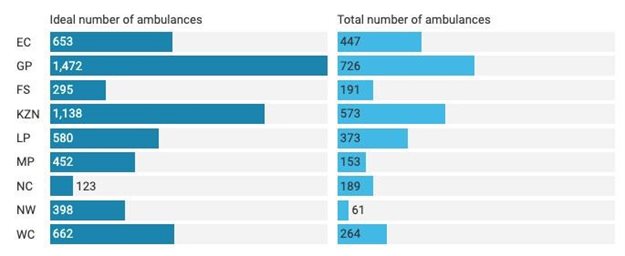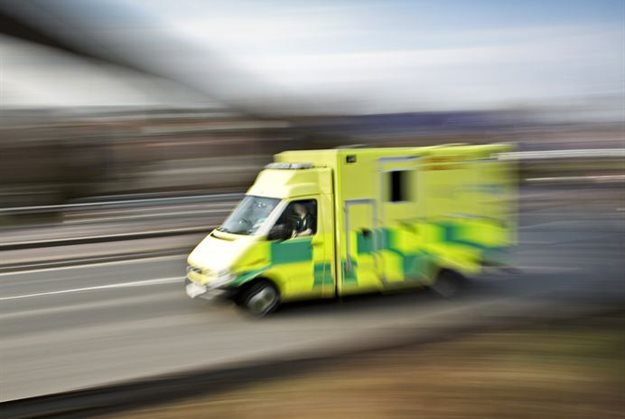The current ambulance and EMS crisis in South Africa is making it less and less likely that patients will get the medical help they need in time. A critical shortage of ambulances is resulting in an unnecessary number of patients dying or suffering further harm due to delays and "no shows".
This is according to Kirstie Haslam, partner at DSC Attorneys, who says that your chances of surviving a medical emergency depend heavily on how quickly you can get to an emergency room; for the majority of South Africans, this means relying on a government ambulance to get them to the nearest hospital.
A recent Bhekisisa survey revealed that South Africa only has 1971 state-run ambulances on the road.
Haslam says that this falls well short of the 5700 – one per every 10,000 people – recommended by the health department. This means that there are only enough ambulances to cover a third of the population.

Ideal versus actual ambulances.Source:
BhekisisaHowever she points out that the critical shortage of ambulances is not the only issue plaguing state-run emergency medical services.
“Slow response times are also exacerbated by poorly trained emergency call centre staff and the lack of accessibility to rural areas due to poor road conditions,” she explains.
Ambulance and first responder delays have tragic results
She adds that delays in getting a patient to a hospital often result in a worsened medical condition, and in some cases even death.
She cites a case in the Eastern Cape which resulted in a young pregnant woman losing her baby because the closest ambulance was 60km away. After a four-hour wait, the woman’s parents eventually paid a neighbour to take her to the hospital. Unfortunately, due to complications brought on by the delay, the woman’s baby died. The ambulance they had called did eventually arrive but only eight hours after the original call.
The woman’s mother maintained that, “If the ambulance response time was not so atrocious, my daughter may not have lost her child.”
Haslam says that in another case, a man testified before the Human Rights Commission about calling an ambulance for his sick sister on a Friday, only to be told that no ambulances were available. He was told to take her to the nearest clinic instead. He tried calling again, to no avail. His sister eventually died two days later. No ambulance was ever dispatched.
Liability when an ambulance is delayed or doesn’t arrive
If an ambulance is delayed or doesn’t arrive due to provable negligence or poor service delivery by the state, Haslam says you might be able to claim for damages.
“The claim could be against the state, the hospital or entity that managed and despatched the ambulance, or the EMTs on the ambulance if their conduct could be considered negligent,” she says.
If you believe you have grounds for an ambulance or EMS negligence claim, Haslam says that you have the right to look at the records, charts and information related to your emergency transport in order to build your case.
“Medical malpractice cases can be lengthy and arduous, so it’s important to make sure you have a strong case and sufficient legal representation and support,” she concludes.















































